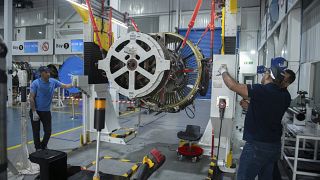Business Africa
IMF, World Bank: faces urgent need for reform
50 years after holding their last annual meetings on the continent, the World Bank and the International Monetary Fund returned to Africa for their Marrakech meeting, under the banner of reform and climate financing.
Unsurprisingly, Africa was at the heart of many of the discussions, confronted as it is by a debt crisis affecting several of the continent's countries, the consequences of global warming, and poverty that is being reduced at a slower pace than elsewhere.
At a time when the Bretton Woods institutions are facing a growing chorus of criticism over the under-representation of the poorest countries in their decision-making processes, the IMF and the World Bank have announced plans to grant Africa additional seats on their boards.
Will this gesture be enough to satisfy African countries' desire for better representation in international institutions?
Find out more in this episode of Business Africa with Abebe Aemro Selassie, Director of the IMF's Africa Department.
FAO supports aquaculture in Nigeria
In Nigeria, aquaculture is demonstrating its extraordinary potential for creating businesses and jobs.
Demand for aquatic foods is high in Africa's most populous country, where fish accounts for 37% of animal protein intake.
A recent analysis of the Nigerian catfish sector by the Food and Agriculture Organization of the United Nations showed just how important it is, estimating the value of annual catfish production at some 2.6 billion USD.
With the FISH4ACP program, the FAO and its partners have set themselves a goal: to improve the sector's productivity and competitiveness in order to make catfish farming more sustainable in both socio-economic and environmental terms.
Kenya's leather industry seeks growth
A recent report by the Kenya Association of manufacturers revealed that the leather industry is one of the oldest and most resilient sectors of the Kenyan economy. However, it is under-performing and has gone from being a net producer of foreign currency to a net consumer of foreign currency.
Industry players have urged the government to introduce policies to stimulate growth, but the results have been inconclusive. A month ago, the government promised to limit imports of finished leather products, but professionals remain skeptical.





![Countries struggle to keep pace with rapid urbanization [Business Africa]](https://static.euronews.com/articles/stories/07/90/52/44/320x180_cmsv2_d988206e-e0a2-5d36-b9e6-0dc121996580-7905244.jpg)






01:50
Guinness World Record: Chess champion returns home to Lagos
Go to video
Chinese supermarket in Abuja shut for allegedly barring Nigerians
01:13
Nigeria seeking $2.25 billion in World Bank loans
01:47
Environmental Volunteering: Activists gather in Lagos ahead of World Earth Day
00:39
Nigerian chess master plays for 60 hours in bid to set new world record
01:28
Nigeria's crude oil output goes down again in March - OPEC